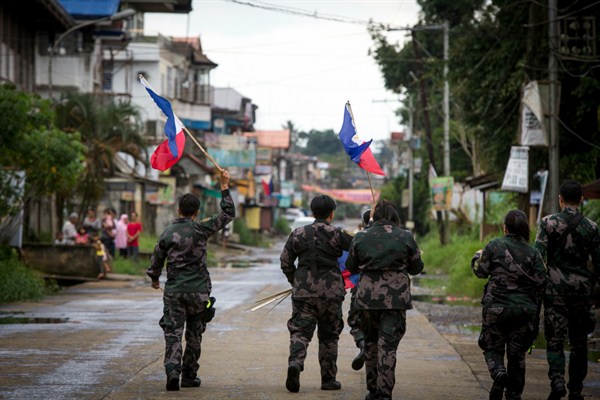JAKARTA, Indonesia—Two months after a coalition of extremist groups affiliated with the self-proclaimed Islamic State swept into the city of Marawi in the southern Philippines, provoking a large-scale military siege to retake it, the militants continue to maintain control of sections of the city. Hundreds of thousands of civilians have been evacuated from the charred and bombed-out city, a testament to the power of the militants to challenge an underequipped and inadequately trained Philippine military. Since the siege began, President Rodrigo Duterte has repeatedly trumpeted the army’s incipient victory. Now it looks likely that Duterte will deliver his State of the Nation address on July 24 while parts of Marawi remain in militant hands.
The ability of Islamic State affiliates to hold territory in the Philippines is deeply worrying to the country’s closest neighbors, Muslim-majority Indonesia and Malaysia, which have both been targeted by terrorist attacks inspired by the Islamic State over the past few years. Embattled on its home front in Syria and Iraq, the Islamic State can only offer limited material support and strategic advice to its Southeast Asian offshoots, which are operating in a completely different strategic environment thousands of miles from Raqqa and Mosul. Yet the jihadi group maintains powerful legitimacy among disaffected young men around the Muslim world.
The Islamic State’s messaging, delivered in online message boards and through chat applications, encourages Southeast Asian Muslims to take up the fight at home and join local militias pledged to the so-called caliphate, such as the Maute Group that seized Marawi. As Reuters reported, intercepted militant chats revealed Islamic State militants encouraging young extremists to head “to the Philippines. Door is opening.”

